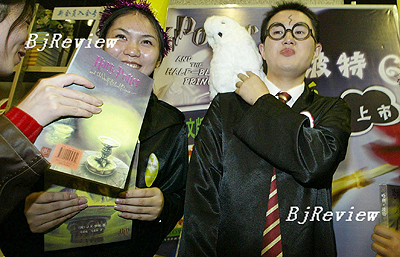
About a month ago, Sun Shunlin was shocked when a friend handed him a gift. It wasn't the gesture, so much as the gift itself. There in all its glory was a Chinese version of Harry Potter and the Deathly Hallows, the seventh and final in the series of the internationally acclaimed children's books. What compounded Sun's reaction is that he is the promotion executive at Beijing-based People's Literature Publishing Housing, the only authorized Chinese-language publisher of all seven Harry Potter books on Chinese mainland. This meant Sun was well aware the launch of the Chinese version of the Deathly Hallows is only in October.
At the time Sun received his gift, the world launch of the novel on July 21 was a month away. Sun's friend said he had paid a street book vendor 10 yuan (little over $1) for the book in downtown Beijing. When Sun tried to investigate which publishing house had weaved its own web of magic to get the their hands on the closely guarded manuscript, he was appalled to find the name of his own publishing house on the inside cover. And to make matters worse, the layout of the book had literally been copied from the Chinese version of last Harry Potter novel: Harry Potter and the Half Blood Prince. The poorly printed text was filled with tales of the love triangle involving Harry, Ron and Hermione and the ongoing violent battle between good and evil.
"It does not even qualify as a pirated book, rather a fake book with a made-up story focusing on sex and violence," said Sun.
Sun said that while there have been similar pirated cases in the past, each time was always a shock. He said there were three types of unauthorized Harry Potter books on the Chinese market since the release of the fifth book. Haphazard compositions in Chinese usually surface before the global release, which is followed by poorly translated Chinese version between the global launch of the English version and the publication of the Chinese version. In addition are the slick photocopied versions of the authentic Chinese Harry Potter books.
As top-ranking bestsellers in China, the first six Harry Potter books have each sold over 1.5 million copies here. According to the copyright department of People's Literature Publishing House, they have helped government confiscate over 10,000 copies of counterfeit books for each of the six books, which were sold at a fraction of the price of an authentic book.
"As a bestseller, we will definitely not be the worst victim of counterfeiting," said Sun, hinting that in some cases pirates are not making as much money as they would like to. He explained that the large sales volume of the first four Harry Potter books have forced anti-piracy agencies to make special protective arrangements for future Harry Potter books, in an effort to thwart the creativity of pirates. Sun said the high sales of the Potter books is due to the many years fans have had to develop loyalty toward the boy wizard. Now all these fans are all willing to pay more for a real copy of the book.
Copyright measures
In the face of all this, China is upping the ante on piracy. During a 100-day anti-piracy campaign that started on July 15, 2006, police and government officials have raided more than 537,000 book markets, shops and street vendors seizing a monthly average of 19.46 million illegal publications from July through September. In order to avoid a return to "business as normal" once the 100-day campaign was complete, it was linked to a new crackdown called Anti-Privacy Every Day, which has been confiscating pirated products in unprecedented volumes.
Liu Binjie, Director of the National Copyright Administration, announced in July that a new adopted policy of fighting copyright violation aims to set up national funds to reward any member of the public who exposes piracy.
China's top court has stepped up the fight against the abuse of intellectual property rights by lowering the threshold to prosecute people manufacturing or selling counterfeit copyrighted products.
The new interpretation issued by the Supreme People's Court in April states that anyone who manufactures 500 or more counterfeit copies (discs) of computer software, music, movies, TV series and other audio-video products, can be prosecuted and imprisoned for up to seven years.
Fines for convicted counterfeiters were also raised, to range from 1 to 15 times the illegal earnings, or from 50 to 200 percent of the business turnover.
Still an uphill battle
Despite these valiant efforts from the government, China still has a long way to go in eradicating piracy. This is the opinion of many, including Yi Zhongtian, a university history professor who gained overnight fame by giving his unique analysis on Chinese historical figures on highly popular TV show. Yi has since become a victim of circumstance. His rise to stardom pushed the sales of his books into the bestseller rankings. In the process he became the most pirated Chinese author in recent years. On a TV program in March, Yi told viewers how upset he is at seeing several pirated books using his name as author, when in fact he has nothing to do with the books. To show the extent of the problem, Shanghai Youth Daily recently quoted a survey showing Yi's most-read work Savor the Three Kingdoms, which has sold over 5 million copies, has had roughly the same sales volume on the pirate market.
Pan Kaixiong, Deputy Publisher of People's Literature Publishing House, told Southern Daily before the launch of Harry Potter and the Half Blood Prince that a worrisome trend is that new photocopying technologies have enabled pirate manufacturers to improve the quality of text and pictures in photocopied counterfeit books.
No doubt for many in China who find their favorite adventure novel conveniently available from a street vendor at one 10th of its original price, and well printed, resisting the temptation may be tough, despite one's best intentions. | 